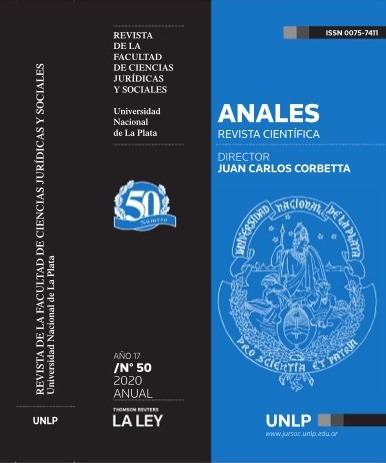The fallacious problem of fallacies and the law
DOI:
https://doi.org/10.24215/25916386e063Keywords:
argumentation, reasoning, informal fallacies, lawAbstract
One of the main theses I sustain in this work is that the problem with fallacies has been laid out in a way that is excessively superficial. A review of the definition of ‘fallacies’, and a critique of the methodology used to address them, leads to state that considering part of their nature is being relative, contextually-bound, dependent of aspects other than the discourse validity has been omitted. These vices are more notorious when this is taken to the Legal field: fallacious discourses exist, and must be denounced, but, simultaneously, there exist other Legal discourses which are—or embed—fallacies, yet are, however, admitted to the point that some might even be considered a virtuous principle.
Downloads
References
Atienza, M. (2006). El derecho como argumentación. Barcelona: Editorial Ariel.
Bermejo Luque, L. (2013). Falacias y argumentación. Murcia: Plaza y Valdés Editores.
Casals Carro, M. J. (1998). El argumento ‘petitio principii’: una falacia para dogmáticos. Estudios sobre el mensaje periodístico, número 4. Madrid: UCM.
Comesaña, J. M. (2001). Lógica informal. Falacias y argumentos filosóficos. Buenos Aires: EUDEBA.
Copi, I. M. (1994). Introducción a la lógica. 34º ed. Buenos Aires: EUDEBA.
Da Silveira, P. (2004). Cómo ganar discusiones (o al menos cómo evitar perderlas). Buenos Aires: Editorial Taurus.
Deaño, A. (1980). Las concepciones de la lógica. Madrid: Editorial Taurus.
Dehesa Dávila, G. (2007). Introducción a la retórica y la argumentación. 4º ed. México: Suprema Corte de Justicia de la Nación.
Finocchiaro, M. (1981). Fallacies and the evaluation of reasoning. American Philosophical Quartely. Illinois: University of Illinois Press.
Govier, T. (2012). A Practical Study of Argument. 7th ed. Belmont CA: Wadsworth.
Hamblin, C. L. (2016). Falacias. Lima: Palestra Editores.
Kant, I. (2000). Lógica. Un manual de lecciones. Madrid: Ediciones Akal.
Navarro, P. y Rodríguez, J. (2000). Derrotabilidad y sistematización de normas jurídicas. Revista Isonomía, número 13. México: Instituto Tecnológico Autónomo de México.
Perelman, C. y Olbrechts-Tyteca, L. (1989). Tratado de la argumentación. La nueva retórica. Madrid: Gredos.
Schopenhauer, A. (2013). El arte de tener razón: expuesto en 38 estratagemas. Buenos Aires: Editorial Quadrata de Incunable.
Vega Reñón, L. (2008). La argumentación a través del espejo de las falacias. Recuperado de www.filosoficas.unam.mx/~Tdl/11-1/0407Vega.pdf
Vega Reñón, L. (2013) La fauna de las falacias. Madrid: Editorial Trotta.
Vega Reñón, L. Las falacias. Una introducción. Recuperado de https://www.academia.edu/5541284/LAS_FALACIAS_-_UNA_INTRODUCCIÓN
Walton, D. (1987). Informal fallacies. Amsterdam: Publishing Co.
Downloads
Published
How to Cite
Issue
Section
License
Esta licencia no permite la generación de obras derivadas ni hacer un uso comercial de la obra original, es decir, sólo son posibles los usos y finalidades que no tengan carácter comercial.






























